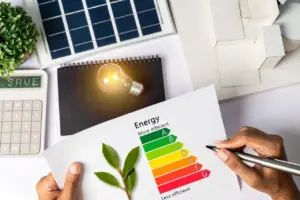17 June 2024
Top energy-saving myths busted
In the quest for a greener and more energy efficient lifestyle, it’s easy to fall prey to common myths. To help you navigate all the misinformation, we’ve debunked some of the top energy saving myths.

Myth 1: Solar panels only work in summer
It’s a common misconception that solar panels are only effective during the summer months. In reality, solar panels are functional all year round. While they do produce more energy on sunny days, they can still generate electricity on cloudy days. Modern solar panels are designed to capture various types of light, including indirect sunlight, which means they can still produce electricity even when the weather isn’t ideal. So, don’t let cloudy days discourage you from investing in solar energy! If you’re not sure whether your panels are working correctly, book a $99* Solar System Check.
Myth 2: Hand washing uses less water and energy than the dishwasher

Many believe that washing dishes by hand is more eco friendly than using a dishwasher. However, this isn’t usually the case. Modern dishwashers are designed to be highly efficient, often using less water and energy than hand washing. According to various studies, a fully loaded dishwasher can save up to 23,000 litres of water and 230 hours of personal time a year compared to hand washing. To maximise efficiency, make sure to run your dishwasher only when it’s full and use the eco or energy saving settings.
Myth 3: Switching off an appliance stops it from using electricity
You might think that turning off an appliance completely stops its electricity consumption. However, many appliances continue to draw power even when they’re turned off. This phenomenon is known as “phantom” or “standby” power. Devices like televisions, computers, and chargers often consume electricity as long as they’re plugged in. To truly cut off the power supply, you need to unplug these devices or use a power board with an on/off switch.
Myth 4: Using electricity at night is cheaper

The idea that night time electricity usage is always cheaper stems from the concept of off-peak hours. While it’s true that some energy providers offer lower rates during off-peak times, this isn’t a universal rule. Electricity pricing depends on your specific provider and plan. To determine if using electricity at night is more economical for you, check with your energy supplier to understand their rate structure and whether they offer off-peak plans.
For more tips on increasing your home’s energy efficiency and saving money on energy bills, call us today on 1300 054 488 to schedule a home energy audit.

